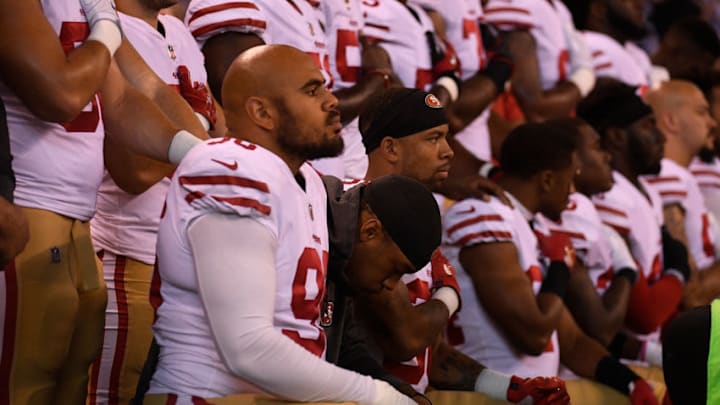The idea of a rule requiring players to stand during the national anthem proves that Sept. 24 was a massive moment of grandstanding.
On Tuesday, the social battle occurring within the NFL took an interesting turn. News broke that the leadership is looking at the idea of a rule that requires players to stand during the national anthem. This is a major shift from actions and statements the league made a few weeks ago. If the rule is actually created it is a blatant slap in the face of the players and the communities in which many of them represent.
It’s clear how we’ve reached this point. Last season, Colin Kaepernick began kneeling during the playing of the national anthem to protest police brutality and other forms of social oppression going on within minority communities throughout the nation.
He explained his reasons for kneeling initially when talking to NFL Media in 2016:
"“I am not going to stand up to show pride in a flag for a country that oppresses black people and people of color,” Kaepernick told NFL Media in an exclusive interview after the game. “To me, this is bigger than football and it would be selfish on my part to look the other way. There are bodies in the street and people getting paid leave and getting away with murder.”"
Fast forward to 2017 and that purpose has shifted in dramatic fashion. What started as a protest to draw attention to the social ills impacting minorities in the United States now means something very different depending on who you ask.
More from NFL Spin Zone
- Dallas Cowboys made the trade everyone else should have made
- Pittsburgh Steelers rookie sleeper everyone should be talking about
- Anthony Richardson putting jaw-dropping talent on display immediately
- Denver Broncos’ stud wide receiver might be out for a while
- Washington Commanders: Three takeaways from win over Ravens
President Donald Trump’s voice has been the loudest and perhaps most incendiary in the conversation to date. His attack on players while speaking in Alabama, calling them “sons of b*****s” sparked applause during the event and responses throughout the league. Nearly every team used their time in the spotlight on Sept. 24 to loudly state that President Trump’s words were heard and were not appreciated. At least that’s how it seemed at first.
Less than three weeks later, there’s growing news that the NFL is having conversations about this new rule. Dallas Cowboys owner Jerry Jones has gone on record to say that players who kneel will sit during that game, effectively punishing them for taking a moral stand. Commissioner Roger Goodell has spoken multiple times about the matter and the need for next steps. He said this in his latest statement, taken from The Washington Post:
"“Like many of our fans, we believe that everyone should stand for the national anthem,” Goodell wrote to NFL club presidents and chief executives. “It is an important moment in our game. We want to honor our flag and our country, and our fans expect that of us. We also care deeply about our players and respect their opinions and concerns about critical social issues. The controversy over the anthem is a barrier to having honest conversations and making real progress on the underlying issues. We need to move past this controversy, and we want to do that together with our players.”"
This is an interesting development in the growing intersection of sports and social activism. Players throughout the league used a peaceful method to protest the problems many saw in the communities that these teams play within. However, drawing attention to those issues caused so much discomfort through the NFL’s fan base that the league is looking to reprimand those who refuse to stand.
As many expected, Sept. 24 was nothing more than a moment of grandstanding throughout the NFL. The widespread kneeling and linking of arms was not to show support for the reason that Kaepernick dropped to one knee. Some have gone as far to call it “whitewashing” or “gentrification” of the social movement. The fact that this has become a discussion shows that the NFL never really cared about the real cause behind the movement.
Next: NFL 2017: Picks against the spread for Week 6
The phases of this battle will be interesting to watch. On one side, the NFL is looking to appease a portion of its fan base that is unhappy with players protesting. Players and onlookers who understand the real purpose behind the movement then sit on the other side.
In a league with many public relations struggles due to players and personnel committing illegal or socially unacceptable acts, it’s amazing to watch how quickly action has been taken against a peaceful protest. The NFL will use a player’s backstory of poverty and struggle to build their star power, but once players bond together to draw attention to those social ills, they are quickly silenced.
